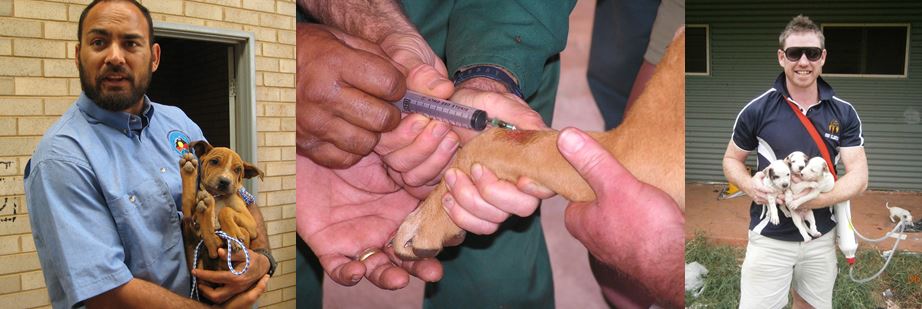Dog Health Program
Delivery of the Dog Health Program to remote communities is an important aspect of managing Aboriginal environmental health.
An effective program improves the health and welfare of these significant companion animals, assists in the management of dog populations and in turn, has a positive impact on the health and well-being of people living within communities.
Impact of dogs on communities
Aboriginal people have had a long cultural relationship with dogs, which dates back to the introduction of the dingo thousands of years ago. Today, the dingo has been largely replaced by domestic dogs.
Healthy dogs are a source of pride for Aboriginal people, but thin, mangy dogs can be a source of shame. Whilst Aboriginal people are strongly attached to their dogs, they generally live a free-ranging life and receive minimal veterinary attention. Unlike dingoes, domestic dogs breed twice a year, which can quickly result in large numbers being present within a community.
When dog populations are not well managed, they can have a number of negative impacts on community health and wellbeing. These include:
- transmitting diseases to people
- forming packs and attacking people or other animals
- leaving droppings/faeces around the community
- making noise
- chasing cars
- scavenging for food
- knocking over rubbish bins
Why have a Dog Health Program?
An effective Dog Health Program can have a number of positive impacts on the community, which include:
- improving the health of people living in communities by reducing disease transmission from dogs
- improving the health of dogs and animal welfare within the community
- increasing owner pride and self-esteem through healthier looking dogs
- reducing hygiene and nuisance problems associated with dogs

Dog Health Program training
Dog Health Program training courses are coordinated by the WA Health Aboriginal Environmental Health Program and conducted by contracted Veterinarians. Training courses focus on a combination of theory and practical skills related to dog health.
Successful trainees develop an understanding of the impact of dogs on Aboriginal people and become authorised to treat dogs in remote communities using the following;
- Cydectin topical to treat parasites
- Covinan (proligestone) injection for female sterilisation
- pentobarbitone injection for euthanasia.
Success of the program requires the trained individual to conduct three-monthly visits to each community. This is because Covinan (sterilisation) and Cydectin (anti-parasitic) require regular administration (every three months) to remain effective.
Future training courses will be advertised here.
Dog behaviour and handling
If you are involved in a Dog Health Program, it's important that you understand how to work with animals safely and humanely. The following video will provide you with some basic information on dog behaviour and handling.
More information
Please contact the Aboriginal Environmental Health Program:
Phone: (08) 9222 2000
Email: ehinfo@health.wa.gov.au
Last reviewed: 12-06-2019